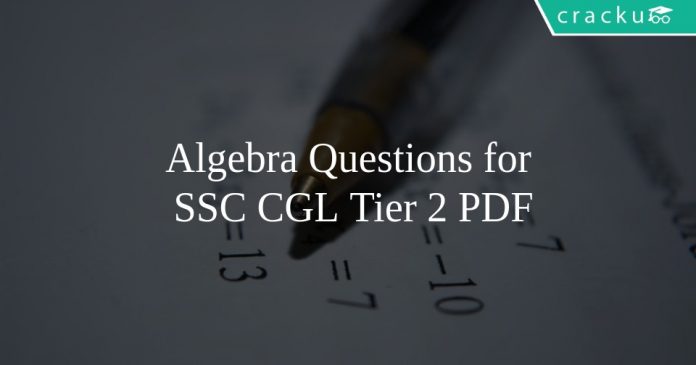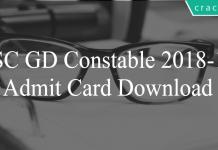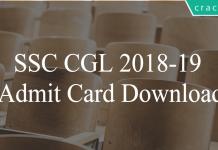Algebra Questions for SSC CGL Tier 2 PDF
Download SSC CGL Tier 2 Algebra Questions PDF. Top 15 SSC CGL Tier 2 questions based on asked questions in previous exam papers very important for the SSC exam.
Download Algebra Questions for SSC CGL Tier 2 PDF
Get 10 SSC CGL Tier-2 Mocks for Rs. 149
Take SSC CGL Tier-2 Mock Tests
Download SSC CGL Tier-2 Previous Papers PDF
Question 1: If x = √5+ 2, then the value $\frac{2x^2-3x-2}{3x^2-4x-3}$ is equal to
a) 0.185
b) 0.525
c) 0.625
d) 0.785
Question 2: The value of $\frac{(243)^\frac{n}{5}\times3^{2n+1}}{9^n\times3^{n-1}}$ is
a) 3
b) 9
c) 6
d) 12
Question 3: The value of 204 × 197 is
a) 40218
b) 40188
c) 40212
d) 39812
Question 4: What number must be added to the expression $16a^{2} -12a$ to make it a perfect square ?
a) $\frac{9}{4}$
b) $\frac{11}{2}$
c) $\frac{13}{2}$
d) $16$
Question 5: The simplest form of the expression $\frac{p^2-p}{2p^3+6p^2}+\frac{p^2-1}{p^2+3p}+\frac{p^2}{p+1}$
a) $2p^{2}$
b) $\frac{1}{2p^2}$
c) $p+3$
d) $\frac{1}{p+3}$
Take SSC CGL Tier-2 Mock Tests
Download SSC CGL Tier-2 Previous Papers PDF
Question 6: If $\frac{5x}{2x^2+5x+1}=\frac{1}{3}$ then the value of $(x+\frac{1}{2x})$ is
a) 15
b) 10
c) 20
d) 5
Question 7: If $x = \frac{2\sqrt{6}}{\sqrt{3}+\sqrt{2}}$, then the value of $\frac{x+\sqrt{2}}{x-\sqrt{2}} + \frac{x+\sqrt{3}}{x-\sqrt{3}}$ is
a) $\sqrt{2}$
b) $\sqrt{3}$
c) $\sqrt{6}$
d) $2$
Question 8: If $x^2 – 3x + 1= 0$ and x > 1, then the value of $(x – \frac{1}{x})$
a) √5 only
b) 1
c) √5 only
d) ±√5
Question 9: If $(x-3)^2 + (y – 5)^2 + (z-4)^2 = 0$ then the value of $\frac{x^2}{9} + \frac{y^2}{25} + \frac{z^2}{16}$
a) 12
b) 9
c) 3
d) 1
Question 10: Coefficient of x in (x + 9)(8 – 5x) is
a) 37
b) -53
c) -37
d) 53
18000+ Questions – Free SSC Study Material
Question 11: Coefficient of x in (x + 8)(6 – 3x) is
a) 18
b) 30
c) -18
d) -30
Question 12: If $3x^{2} = 10^{2} – 5^{2}$, find the value of x?
a) 7
b) 5
c) 9
d) 11
Question 13: Simplify 437bxaz / 23ab.
a) 17xzb
b) 9xz
c) 19xz
d) 19ab
Question 14: If 2(3x -4) - 2 < 4x -2 ≥ 2x - 4; then the value of x is
a) 2
b) 5
c) 4
d) -5
Question 15: If a * b = 2a + 3b – ab, then the value of (3 * 5 + 5 * 3) is
a) 10
b) 6
c) 4
d) 2
Download SSC CGL General Science Notes PDF
Free SSC Preparation (Videos Youtube)
Answers & Solutions:
1) Answer (C)
Given , x = (√5+ 2)
$\frac{2x^2-3x-2}{3x^2-4x-3}$ = $\frac{2(\sqrt{5}+ 2)^2-3(\sqrt{5}+ 2)-2}{3(\sqrt{5}+ 2)^2-4(\sqrt{5}+ 2)-3}$
= $\frac{21.18}{33.88}$
= 0.625
2) Answer (B)
=$\frac{(3)^\frac{5n}{5}\times3^{2n+1}}{3^2n\times3^{n-1}}$
=$\frac{(3)^{3n+1}}{3^{3n-1}}$
=${(3)^{3n+1-3n+1}}$
=$(3)^{2}$ = 9 (B)
3) Answer (B)
$200\times197=(200+4)(200-3)=(200)^{2}+4(200)-3(200)-12=40000+200-12=40188$
so the answer is option B.
4) Answer (A)
Using the rule, $a^2 – 2ab + b^2 = (a-b)^2$
=> $16a^2 – 12a = (4a)^2 – 2*4a*\frac{3}{2}$
= $(4a)^2 – 2*4a*\frac{3}{2} + (\frac{3}{2})^2 – \frac{9}{4}$
= $(4a – \frac{3}{2})^2$
=> $\frac{9}{4}$ should be added to make the above expression a perfect square.
5) Answer (B)
$\frac{p^2-p}{2p^3+6p^2}$ = $\frac{p(p-1)}{2p^2(p+3)}$ = $\frac{(p-1)}{2p(p+3)}$
$\frac{p^2-1}{p^2+3p}$ = $\frac{(p-1)(p+1)}{p(p+3)}$
$\frac{p^2}{p+1}$ = $\frac{p^2}{p+1}$
$\frac{(p-1)}{2p(p+3)}$ + $\frac{(p-1)(p+1)}{p(p+3)}$ + $\frac{p^2}{p+1}$ = $\frac{1}{2p^2}$
6) Answer (D)
Expression : $\frac{5x}{2x^2+5x+1}=\frac{1}{3}$
=> $2x^2 + 5x + 1 = 15x$
=> $2x^2 + 1 = 10x$
To find : $(x+\frac{1}{2x})$
= $\frac{2x^2 + 1}{2x}$
= $\frac{10x}{2x}$
= 5
7) Answer (D)
Given : $x = \frac{2\sqrt{6}}{\sqrt{3}+\sqrt{2}}$
=> $x = \frac{2\sqrt{6}}{\sqrt{3}+\sqrt{2}}\times(\frac{\sqrt3-\sqrt2}{\sqrt3-\sqrt2})$
=> $x=\frac{2\sqrt6(\sqrt3-\sqrt2)}{3-2}$
=> $x=2\sqrt{18}-2\sqrt{12}$
=> $x=6\sqrt2-4\sqrt3$ —————(i)
To find : $\frac{x+\sqrt{2}}{x-\sqrt{2}} + \frac{x+\sqrt{3}}{x-\sqrt{3}}$
= $\frac{6\sqrt2-4\sqrt3+\sqrt{2}}{6\sqrt2-4\sqrt3-\sqrt{2}} + \frac{6\sqrt2-4\sqrt3+\sqrt{3}}{6\sqrt2-4\sqrt3-\sqrt{3}}$ [Using (i)]
= $\frac{7\sqrt{2}-4\sqrt3}{5\sqrt{2}-4\sqrt3} + \frac{6\sqrt2-3\sqrt{3}}{6\sqrt2-5\sqrt{3}}$
= $\frac{(84-35\sqrt6-24\sqrt6+60)+(60-15\sqrt6-24\sqrt6+36)}{60-25\sqrt6-24\sqrt6+60}$
= $\frac{240-98\sqrt6}{120-49\sqrt6}$
= $\frac{2(120-49\sqrt6)}{120-49\sqrt6}=2$
=> Ans – (D)
8) Answer (D)
Expression : $x^2 – 3x + 1= 0$
=> $x^2 + 1 = 3x$
Dividing by $(x)$ on both sides
=> $x + \frac{1}{x} = 3$
$\because (x – \frac{1}{x})^2 = (x + \frac{1}{x})^2 – 4$
=> $x – \frac{1}{x} = \sqrt{9 – 4}$
=> $(x – \frac{1}{x}) = \pm\sqrt{5}$
9) Answer (C)
Expression : $(x-3)^2 + (y – 5)^2 + (z-4)^2 = 0$
Since, all the terms are positive, the only way the sum can be ‘0’ is, if each term is equal to 0.
=> $(x – 3)^2 = 0$
=> $x = 3$
Similarly, $y = 5$ & $z = 4$
To find : $\frac{x^2}{9} + \frac{y^2}{25} + \frac{z^2}{16}$
= $\frac{3^2}{9} + \frac{5^2}{25} + \frac{4^2}{16}$
= 1 + 1 + 1 = 3
10) Answer (C)
A coefficient is a numerical or constant quantity placed before and multiplying the variable in an algebraic expression. Eg : In $ax^2$, coefficient is $a$
Expression : $(x + 9)(8 – 5x)$
= $8x – 5x^2 + 72 – 45x$
= $-5x^2 – 37x + 72$
$\therefore$ Coefficient of $x$ = -37
=> Ans – (C)
11) Answer (C)
A coefficient is a numerical or constant quantity placed before and multiplying the variable in an algebraic expression. Eg : In $ax^2$, coefficient is $a$
Expression : $(x + 8)(6 – 3x)$
= $6x – 3x^2 + 48 – 24x$
= $-3x^2 – 18x + 48$
$\therefore$ Coefficient of $x$ = -18
=> Ans – (C)
12) Answer (B)
Expression : $3x^{2} = 10^{2} – 5^{2}$
=> $3x^2 = 100 – 25$
=> $3x^2 = 75$
=> $x^2 = \frac{75}{3} = 25$
=> $x = \sqrt{25} = 5$
=> Ans – (B)
13) Answer (C)
Expression : $\frac{437 b x a z}{23 a b}$
= $\frac{437}{23} \times \frac{abxz}{ab}$
= $19 x z$
=> Ans – (C)
14) Answer (A)
Expression 1 : 2(3x -4) - 2 < 4x -2
=> $6x-8-2$ < $4x-2$
=> $6x-4x$ < $-2+10$
=> $2x$ < $8$
=> $x$ < $4$ ————(i)
Expression 2 : 4x -2 ≥ 2x - 4
=> $4x-2x \geq -4+2$
=> $2x \geq -2$
=> $x \geq -1$ ————(ii)
Combining inequalities (i) and (ii), we get : $-1 \leq x$ < $4$
The only value that $x$ can take among the given options = 2
=> Ans – (A)
15) Answer (A)
For 3*5 put a=3 and b=5 in given equation
and for 5*3 put a=5 and b=3 in equation
now add both values
DOWNLOAD APP FOR SSC FREE MOCKS
We hope this Algebra Questions pdf for SSC CGL Tier 2 exam will be highly useful for your Preparation.





